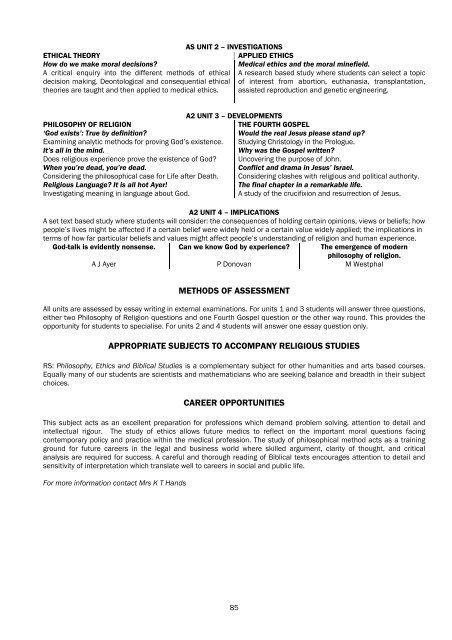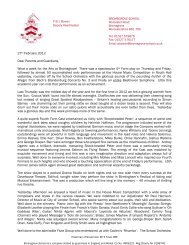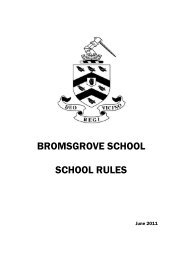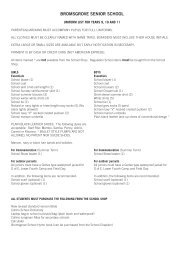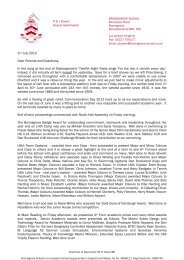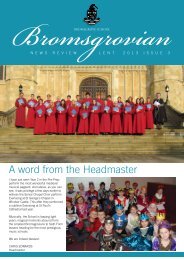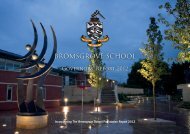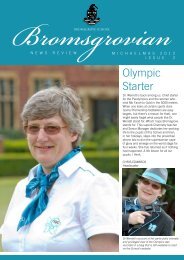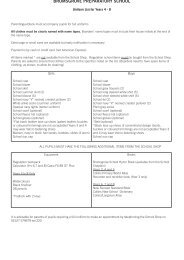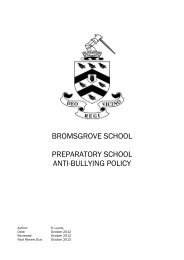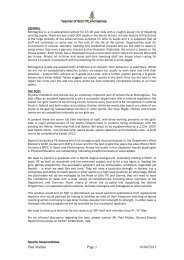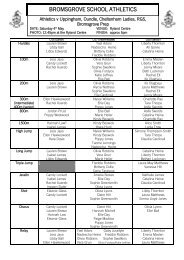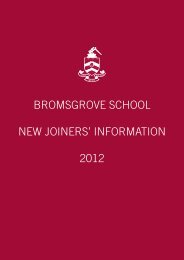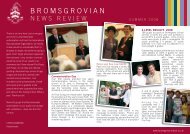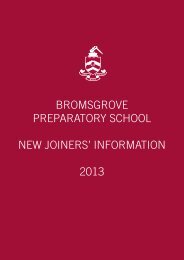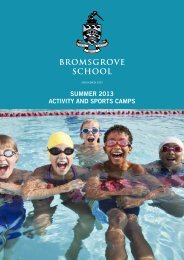Sixth Form Course Booklet 2013 - Bromsgrove School
Sixth Form Course Booklet 2013 - Bromsgrove School
Sixth Form Course Booklet 2013 - Bromsgrove School
Create successful ePaper yourself
Turn your PDF publications into a flip-book with our unique Google optimized e-Paper software.
ETHICAL THEORY<br />
How do we make moral decisions?<br />
A critical enquiry into the different methods of ethical<br />
decision making. Deontological and consequential ethical<br />
theories are taught and then applied to medical ethics.<br />
AS UNIT 2 – INVESTIGATIONS<br />
APPLIED ETHICS<br />
Medical ethics and the moral minefield.<br />
A research based study where students can select a topic<br />
of interest from abortion, euthanasia, transplantation,<br />
assisted reproduction and genetic engineering.<br />
A2 UNIT 3 – DEVELOPMENTS<br />
PHILOSOPHY OF RELIGION<br />
THE FOURTH GOSPEL<br />
‘God exists’: True by definition?<br />
Would the real Jesus please stand up?<br />
Examining analytic methods for proving God’s existence. Studying Christology in the Prologue.<br />
It’s all in the mind.<br />
Why was the Gospel written?<br />
Does religious experience prove the existence of God? Uncovering the purpose of John.<br />
When you’re dead, you’re dead.<br />
Conflict and drama in Jesus’ Israel.<br />
Considering the philosophical case for Life after Death. Considering clashes with religious and political authority.<br />
Religious Language? It is all hot Ayer!<br />
The final chapter in a remarkable life.<br />
Investigating meaning in language about God.<br />
A study of the crucifixion and resurrection of Jesus.<br />
A2 UNIT 4 – IMPLICATIONS<br />
A set text based study where students will consider: the consequences of holding certain opinions, views or beliefs; how<br />
people’s lives might be affected if a certain belief were widely held or a certain value widely applied; the implications in<br />
terms of how far particular beliefs and values might affect people’s understanding of religion and human experience.<br />
God-talk is evidently nonsense.<br />
A J Ayer<br />
Can we know God by experience?<br />
P Donovan<br />
The emergence of modern<br />
philosophy of religion.<br />
M Westphal<br />
METHODS OF ASSESSMENT<br />
All units are assessed by essay writing in external examinations. For units 1 and 3 students will answer three questions,<br />
either two Philosophy of Religion questions and one Fourth Gospel question or the other way round. This provides the<br />
opportunity for students to specialise. For units 2 and 4 students will answer one essay question only.<br />
APPROPRIATE SUBJECTS TO ACCOMPANY RELIGIOUS STUDIES<br />
RS: Philosophy, Ethics and Biblical Studies is a complementary subject for other humanities and arts based courses.<br />
Equally many of our students are scientists and mathematicians who are seeking balance and breadth in their subject<br />
choices.<br />
CAREER OPPORTUNITIES<br />
This subject acts as an excellent preparation for professions which demand problem solving, attention to detail and<br />
intellectual rigour. The study of ethics allows future medics to reflect on the important moral questions facing<br />
contemporary policy and practice within the medical profession. The study of philosophical method acts as a training<br />
ground for future careers in the legal and business world where skilled argument, clarity of thought, and critical<br />
analysis are required for success. A careful and thorough reading of Biblical texts encourages attention to detail and<br />
sensitivity of interpretation which translate well to careers in social and public life.<br />
For more information contact Mrs K T Hands<br />
85


